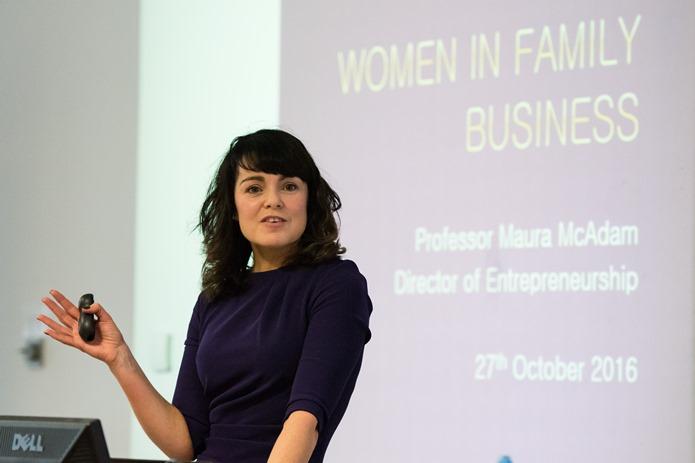

Spotlight on research: the topic of entrepreneurship with Professor Maura McAdam
In the Spotlight on Research series, the focus is on the topic of entrepreneurship wtih Maura McAdam, Professor of Management and Director of Entrepreneurship at DCU.
For the last 17 years I have been actively involved in researching, engaging with entrepreneurs and supporting prospective entrepreneurs in realising their potential. Within my research and the lecture theatre, I like to challenge the popular assumptions of entrepreneurship as being an individual-based form of organising with purely economic finalities. Rather I support the everydayness of entrepreneurship whereby it is a type of action deeply embedded within the fabric of society as opposed to traits possessed by a few heroic (male) individuals!
I believe individuals may dip in and dip out of entrepreneurship at different points throughout their life. It is not just for the young, and in their daily choices they make small discrete actions which cumulatively result in larger entrepreneurial efforts. By taking a more inclusive standpoint - which I refer to as ‘entrepreneuring’ - we broaden what is traditionally viewed as entrepreneurship (solely starting a business), and allows us to appreciate other exciting forms of entrepreneurial activities such as social entrepreneurship, civic entrepreneurship, gig entrepreneurship and academic entrepreneurship.
Do you think entrepreneurship can be taught in the classroom? What are your approaches?
Yes, I very much believe that entrepreneurial attributes can be positively influenced by entrepreneurship education, and that all students can benefit from the acquisition of “enterprise skills for life”. Skills such as negotiating, influencing and selling, which are all deemed important by employers and essential elements of entrepreneurship, can enhance the employability skills of all graduates, regardless of career path chosen.
To this end, I have taught entrepreneurship across a range of disciplines including nursing, engineering, pharmacy and dentistry. In order to aid the acquisition of enterprise skills of life, I am a supporter of experiential teaching and learning by doing, so rather than asking myself “what am I going to teach today? I ask “what am I going to have my students do today”.
Student learning is therefore promoted through creating an environment where students are encouraged to learn and practice enterprise skills in ‘live’ situations and to reflect on their learning.
Your research pieces speak about sexism in the work place, how do you hope to spread these ideas to your students? (https://theconversation.com/do-tech-accelerators-have-a-sexism-problem-47072)
My research into accelerators highlighted that, although portrayed as gender neutral, accelerators were in fact embedded masculine. As a result, women were self-selecting out of this business support mechanism because of a perceived lack of fit. Within my lectures, I want to ignite important conversations around inclusivity and equality. The world economy is driven by sustainable value and business growth, which depend upon attracting, optimising and retaining talent.
Therefore it is an economic imperative that every organisation is fully utilising and optimising the talents of their entire staff, including women. To accelerate closing the gender gap both in the entrepreneurial arena and the workplace, I hope to create gender awareness by encouraging students to challenge social norms associated with gendered role expectations and embedded masculine norms and also by providing access to credible role models. In so doing, I hope to help create not only the next generation of women entrepreneurial leaders but also gender aware male entrepreneurial leaders.
Your book, “Female Entrepreneurship” focuses on women’s experience in the world of business today. What key piece of advice would you give female entrepreneurs?
My intention with this book was to highlight the challenges and also the opportunities associated with women entrepreneurship. Women bring something unique and special to the entrepreneurial table, so my first piece of advice would be to celebrate this uniqueness and never underestimate the impact of your imagination, individuality, and unique ways of seeing things on the products and services that you are creating.
I also find that women entrepreneurs have difficulties with seeing themselves as entrepreneurs and are reluctant to say “I am entrepreneur”- so in addition to celebrating your uniqueness I would encourage female entrepreneurs not to shy away from owing their entrepreneurial identity and commit to their entrepreneurial career as they would to any other career. One way in which to aid self-confidence is to surround yourself with a community of people to help in your entrepreneurial development.
So my last piece of advice is to find your tribe, your own board of personal advisors. For example, a female accelerator programme such as the Ryan Academy Female High Fliers accelerator programme http://www.ryanacademy.ie/what-we-do/female-high-fliers-accelerator/ can help with the building of connections and finding your tribe.
You joined Dublin City University recently. What have you enjoyed most so far and what are you most looking forward to?
Given my own teaching and research philosophies I am already feeling very much at home at DCU and look forward to representing DCU, the University of Enterprise, on an international stage. I am also looking forward to putting gender on the agenda within the Centre of Family Business and enjoyed leading the first “Women in Family Business” workshop which took place in DCU. Given my work looking at women in accelerator programmes, I am also excited about getting involved with the Ryan Academy Female High Fliers Accelerator and working with Irish women entrepreneurs who are transforming their entrepreneurial potential into economic and social impact.
Finally, I have thoroughly enjoyed engaging with the next generation of entrepreneurial leaders – the DCU students!
